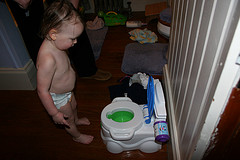
flickr.com/abbybatchelder
Behavioral modification, developed by B.F Skinner (1904-1990), is a psychological approach to treatment. Operant conditioning, which means “undesirable behaviors are replaced with more desirable ones through positive or negative reinforcement,” is the root of behavior modification. Positive reinforcement rewards specific behaviors. It is the more commonly used form of this treatment.
Behavior modification has been used as an effective way of treating bed wetting problems for both children and Read more . . .

